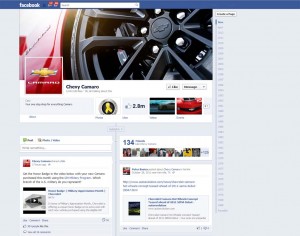Just days before the superstar of the digital world is expected to launch a multi-billion-dollar IPO General Motors has delivered an unexpected blow by revealing it will pull its advertising off the Facebook site by mid-year.
It’s unclear whether the news will have any impact on the Facebook IPO — which is expected to go off on Friday and which had been expected to value the digital firm at as much as $100 billion — but GM’s widely publicized decision underscores a range of recent reports that have questioned the value of advertising on the Facebook site.
“We reassessed our Facebook advertising and will stop advertising by mid-year,” confirmed GM spokesman Pat Morrissey, adding that it was part of a review of overall ad spending conducted on “a regular basis.” Morrissey, spokesman for GM marketing czar Joel Ewanick, stressed that the automaker will revisit its decision in the future and could re-launch its ads on the social media site.
Like its competitors, GM has become highly dependent on digital advertising which now consumes 30% of its total global budget, with such spending expected to rise 3% this year. While the maker won’t discuss specific numbers, citing the need for competitive secrecy, the monitoring service Kantar Media Intelligence estimates GM’s overall global ad budget will run between $3 billion and $4 billion this year.
The maker reportedly was spending a relatively modest $10 million on Facebook which has a relatively limited space for advertising on its site.
Ironically, spokesman Morrissey stressed that GM sees tremendous value in the social media leader – just not in the form of sponsored advertising. The maker has about 8 million “friends” for its various Facebook pages, notably including one for fans of the Chevrolet Camaro.
In the more traditionally advertising world, such pages would be a huge revenue source, perhaps in the form of an advertorial in an enthusiast publication like Car & Driver, or a more mainstream outlet, suggested a source within GM marketing who asked not to be identified by name.
Following up on a story disclosing the automaker’s decision, Wall Street Journal reporter Dennis K. Berman tweeted, “GM has pulled its $10 million advertising campaign from Facebook. Why? The ads didn’t work.”
The automaker is the first high-profile advertiser to confirm its disappointment, though ad industry insiders have expressed significant doubt for some time.
“We’ve used them but the click-through rate was barely one eighth of traditional banner advertising,” noted a high-level media planner at one of Detroit’s top ad agencies. Asking not to be identified by name because they had not been authorized to talk on the subject, the executive said, “We still use it as long as we see some traction” because the service offers powerful targeting technologies, but the use of the service is limited by its lack of response.
That echoes the analysis of WordStream, a search marketing management firm, which found Facebook far less effective than traditional online ad outlets, notably including Google. Online advertising has a relatively low response rate, measured in click-throughs, averaging just 0.1%. Wordstream rates Facebook’s click-through rate at a more anemic 0.051%, while Google generates a 0.4% response.
Others, however, are a bit more upbeat. That includes the nation’s second-largest automotive advertiser, Ford Motor Co. “Social networking is the No. 1 activity and Facebook is the No. 1 site for networking in the U.S.,” asserted Ford’s director of marketing communications Matt VanDyke, In an interview with the Detroit Free Press.
Ford has worked closely with Facebook, VanDyke noted, to ensure it gets maximum value for its money and has gone so far as to stage a product preview for the latest-generation Explorer on the social media site. But as with GM, a significant share of the payoff Ford develops comes from unpaid pages it has created on Facebook.
It remains to be seen whether GM’s announcement will have an impact on the expected Facebook IPO, which is anticipated to generate about $11.8 billion in cash after the site increased the planned strike price for its shares. That would be about six times more than the $1.9 billion generated by Google during its first stock offering in 2004.
Facebook founder and chief executive Mark Zuckerberg, who turns 28 this month, has been anticipating a strong response from potential investors based on the argument that the social media site now has 900 million members who return to Facebook at least once a month.
But if they are ignoring Facebook’s ads, the numbers might not mean as much.
“(GM’s) timing is curious,” said a source at a major ad agency, but it may just be the signal the market needs to be more cautious before getting too enthusiastic on Friday.

